Analyzing Power, Politics, and Conflict in Next PLC Organization
VerifiedAdded on 2023/06/14
|10
|3368
|345
Report
AI Summary
This report provides an academic analysis of power, politics, and conflict within organizations, using Next PLC as a case study. It explores different types of power, including coercive, reward, legitimate, expert, and informational power, and assesses their application within Next PLC. The report also examines organizational politics through the metaphors of 'the weeds,' 'the rocks,' 'the high ground,' and 'the woods,' illustrating how these concepts manifest in the company's operations. Furthermore, it discusses the causes and consequences of workplace conflict, emphasizing the importance of effective conflict management. The conclusion highlights the significance of appropriate authority allocation and the inevitability of conflict, while a reflective statement summarizes personal learning and its relevance to future career endeavors. Desklib offers a variety of solved assignments and past papers to aid students in their academic pursuits.
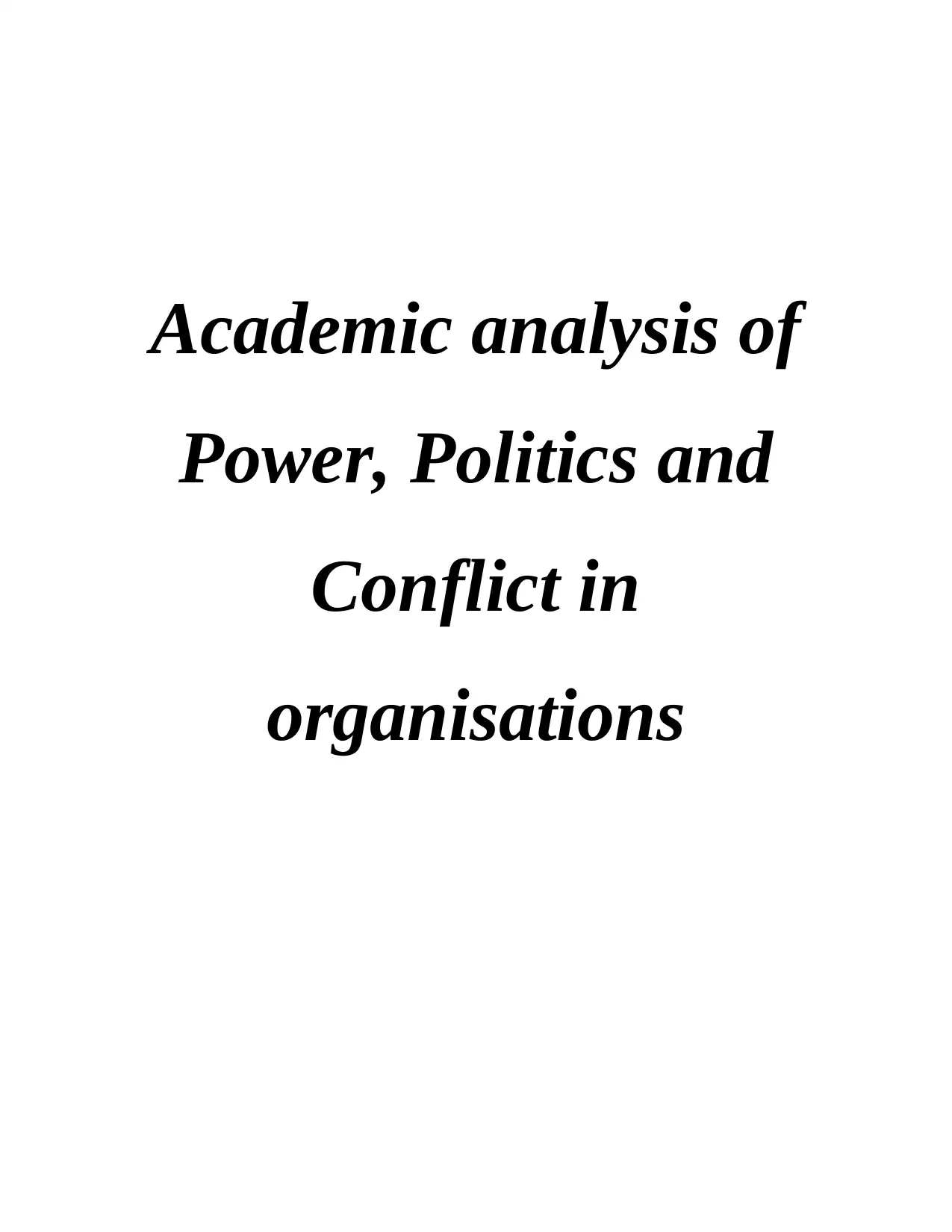
Academic analysis of
Power, Politics and
Conflict in
organisations
Power, Politics and
Conflict in
organisations
Paraphrase This Document
Need a fresh take? Get an instant paraphrase of this document with our AI Paraphraser
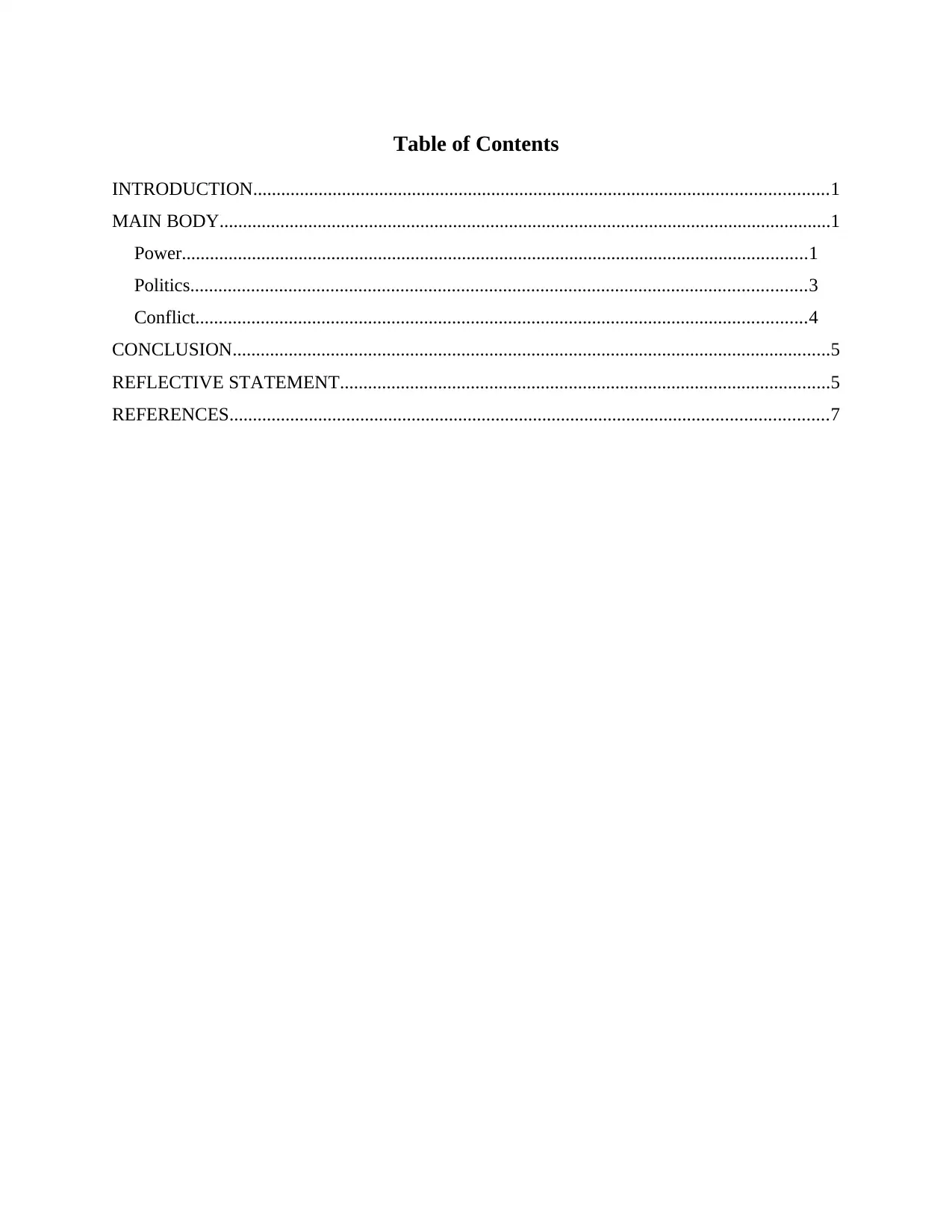
Table of Contents
INTRODUCTION...........................................................................................................................1
MAIN BODY...................................................................................................................................1
Power......................................................................................................................................1
Politics....................................................................................................................................3
Conflict...................................................................................................................................4
CONCLUSION................................................................................................................................5
REFLECTIVE STATEMENT.........................................................................................................5
REFERENCES................................................................................................................................7
INTRODUCTION...........................................................................................................................1
MAIN BODY...................................................................................................................................1
Power......................................................................................................................................1
Politics....................................................................................................................................3
Conflict...................................................................................................................................4
CONCLUSION................................................................................................................................5
REFLECTIVE STATEMENT.........................................................................................................5
REFERENCES................................................................................................................................7
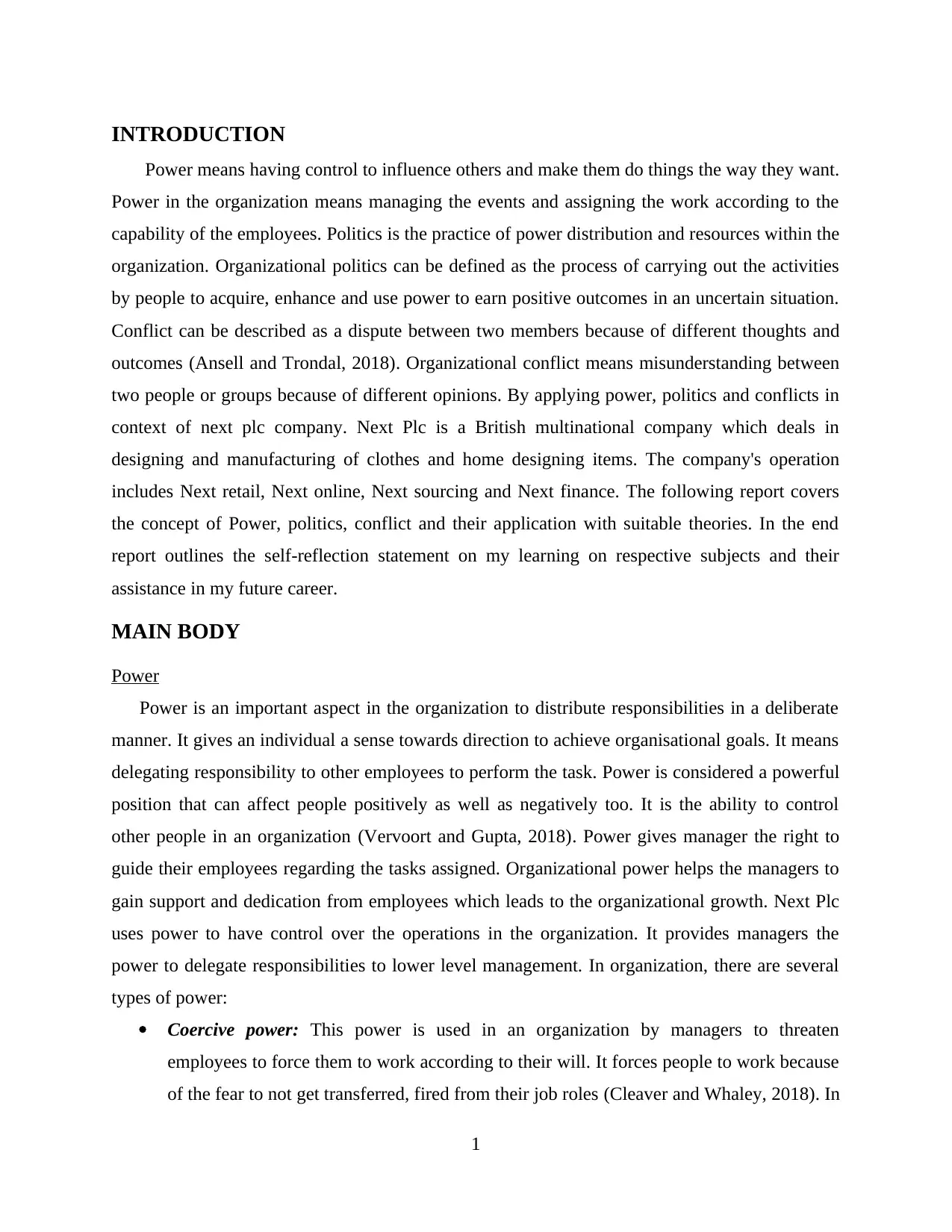
INTRODUCTION
Power means having control to influence others and make them do things the way they want.
Power in the organization means managing the events and assigning the work according to the
capability of the employees. Politics is the practice of power distribution and resources within the
organization. Organizational politics can be defined as the process of carrying out the activities
by people to acquire, enhance and use power to earn positive outcomes in an uncertain situation.
Conflict can be described as a dispute between two members because of different thoughts and
outcomes (Ansell and Trondal, 2018). Organizational conflict means misunderstanding between
two people or groups because of different opinions. By applying power, politics and conflicts in
context of next plc company. Next Plc is a British multinational company which deals in
designing and manufacturing of clothes and home designing items. The company's operation
includes Next retail, Next online, Next sourcing and Next finance. The following report covers
the concept of Power, politics, conflict and their application with suitable theories. In the end
report outlines the self-reflection statement on my learning on respective subjects and their
assistance in my future career.
MAIN BODY
Power
Power is an important aspect in the organization to distribute responsibilities in a deliberate
manner. It gives an individual a sense towards direction to achieve organisational goals. It means
delegating responsibility to other employees to perform the task. Power is considered a powerful
position that can affect people positively as well as negatively too. It is the ability to control
other people in an organization (Vervoort and Gupta, 2018). Power gives manager the right to
guide their employees regarding the tasks assigned. Organizational power helps the managers to
gain support and dedication from employees which leads to the organizational growth. Next Plc
uses power to have control over the operations in the organization. It provides managers the
power to delegate responsibilities to lower level management. In organization, there are several
types of power:
Coercive power: This power is used in an organization by managers to threaten
employees to force them to work according to their will. It forces people to work because
of the fear to not get transferred, fired from their job roles (Cleaver and Whaley, 2018). In
1
Power means having control to influence others and make them do things the way they want.
Power in the organization means managing the events and assigning the work according to the
capability of the employees. Politics is the practice of power distribution and resources within the
organization. Organizational politics can be defined as the process of carrying out the activities
by people to acquire, enhance and use power to earn positive outcomes in an uncertain situation.
Conflict can be described as a dispute between two members because of different thoughts and
outcomes (Ansell and Trondal, 2018). Organizational conflict means misunderstanding between
two people or groups because of different opinions. By applying power, politics and conflicts in
context of next plc company. Next Plc is a British multinational company which deals in
designing and manufacturing of clothes and home designing items. The company's operation
includes Next retail, Next online, Next sourcing and Next finance. The following report covers
the concept of Power, politics, conflict and their application with suitable theories. In the end
report outlines the self-reflection statement on my learning on respective subjects and their
assistance in my future career.
MAIN BODY
Power
Power is an important aspect in the organization to distribute responsibilities in a deliberate
manner. It gives an individual a sense towards direction to achieve organisational goals. It means
delegating responsibility to other employees to perform the task. Power is considered a powerful
position that can affect people positively as well as negatively too. It is the ability to control
other people in an organization (Vervoort and Gupta, 2018). Power gives manager the right to
guide their employees regarding the tasks assigned. Organizational power helps the managers to
gain support and dedication from employees which leads to the organizational growth. Next Plc
uses power to have control over the operations in the organization. It provides managers the
power to delegate responsibilities to lower level management. In organization, there are several
types of power:
Coercive power: This power is used in an organization by managers to threaten
employees to force them to work according to their will. It forces people to work because
of the fear to not get transferred, fired from their job roles (Cleaver and Whaley, 2018). In
1
⊘ This is a preview!⊘
Do you want full access?
Subscribe today to unlock all pages.

Trusted by 1+ million students worldwide
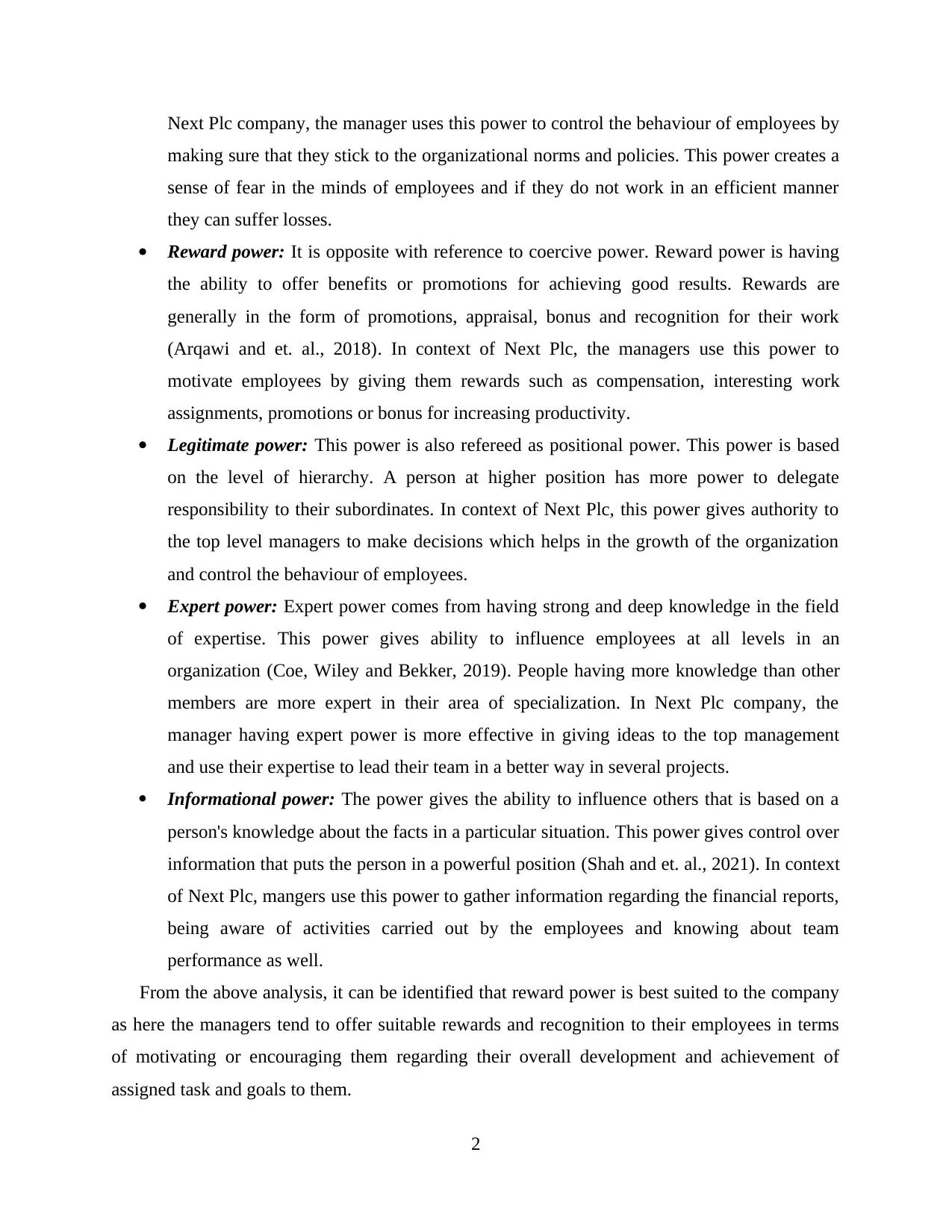
Next Plc company, the manager uses this power to control the behaviour of employees by
making sure that they stick to the organizational norms and policies. This power creates a
sense of fear in the minds of employees and if they do not work in an efficient manner
they can suffer losses.
Reward power: It is opposite with reference to coercive power. Reward power is having
the ability to offer benefits or promotions for achieving good results. Rewards are
generally in the form of promotions, appraisal, bonus and recognition for their work
(Arqawi and et. al., 2018). In context of Next Plc, the managers use this power to
motivate employees by giving them rewards such as compensation, interesting work
assignments, promotions or bonus for increasing productivity.
Legitimate power: This power is also refereed as positional power. This power is based
on the level of hierarchy. A person at higher position has more power to delegate
responsibility to their subordinates. In context of Next Plc, this power gives authority to
the top level managers to make decisions which helps in the growth of the organization
and control the behaviour of employees.
Expert power: Expert power comes from having strong and deep knowledge in the field
of expertise. This power gives ability to influence employees at all levels in an
organization (Coe, Wiley and Bekker, 2019). People having more knowledge than other
members are more expert in their area of specialization. In Next Plc company, the
manager having expert power is more effective in giving ideas to the top management
and use their expertise to lead their team in a better way in several projects.
Informational power: The power gives the ability to influence others that is based on a
person's knowledge about the facts in a particular situation. This power gives control over
information that puts the person in a powerful position (Shah and et. al., 2021). In context
of Next Plc, mangers use this power to gather information regarding the financial reports,
being aware of activities carried out by the employees and knowing about team
performance as well.
From the above analysis, it can be identified that reward power is best suited to the company
as here the managers tend to offer suitable rewards and recognition to their employees in terms
of motivating or encouraging them regarding their overall development and achievement of
assigned task and goals to them.
2
making sure that they stick to the organizational norms and policies. This power creates a
sense of fear in the minds of employees and if they do not work in an efficient manner
they can suffer losses.
Reward power: It is opposite with reference to coercive power. Reward power is having
the ability to offer benefits or promotions for achieving good results. Rewards are
generally in the form of promotions, appraisal, bonus and recognition for their work
(Arqawi and et. al., 2018). In context of Next Plc, the managers use this power to
motivate employees by giving them rewards such as compensation, interesting work
assignments, promotions or bonus for increasing productivity.
Legitimate power: This power is also refereed as positional power. This power is based
on the level of hierarchy. A person at higher position has more power to delegate
responsibility to their subordinates. In context of Next Plc, this power gives authority to
the top level managers to make decisions which helps in the growth of the organization
and control the behaviour of employees.
Expert power: Expert power comes from having strong and deep knowledge in the field
of expertise. This power gives ability to influence employees at all levels in an
organization (Coe, Wiley and Bekker, 2019). People having more knowledge than other
members are more expert in their area of specialization. In Next Plc company, the
manager having expert power is more effective in giving ideas to the top management
and use their expertise to lead their team in a better way in several projects.
Informational power: The power gives the ability to influence others that is based on a
person's knowledge about the facts in a particular situation. This power gives control over
information that puts the person in a powerful position (Shah and et. al., 2021). In context
of Next Plc, mangers use this power to gather information regarding the financial reports,
being aware of activities carried out by the employees and knowing about team
performance as well.
From the above analysis, it can be identified that reward power is best suited to the company
as here the managers tend to offer suitable rewards and recognition to their employees in terms
of motivating or encouraging them regarding their overall development and achievement of
assigned task and goals to them.
2
Paraphrase This Document
Need a fresh take? Get an instant paraphrase of this document with our AI Paraphraser
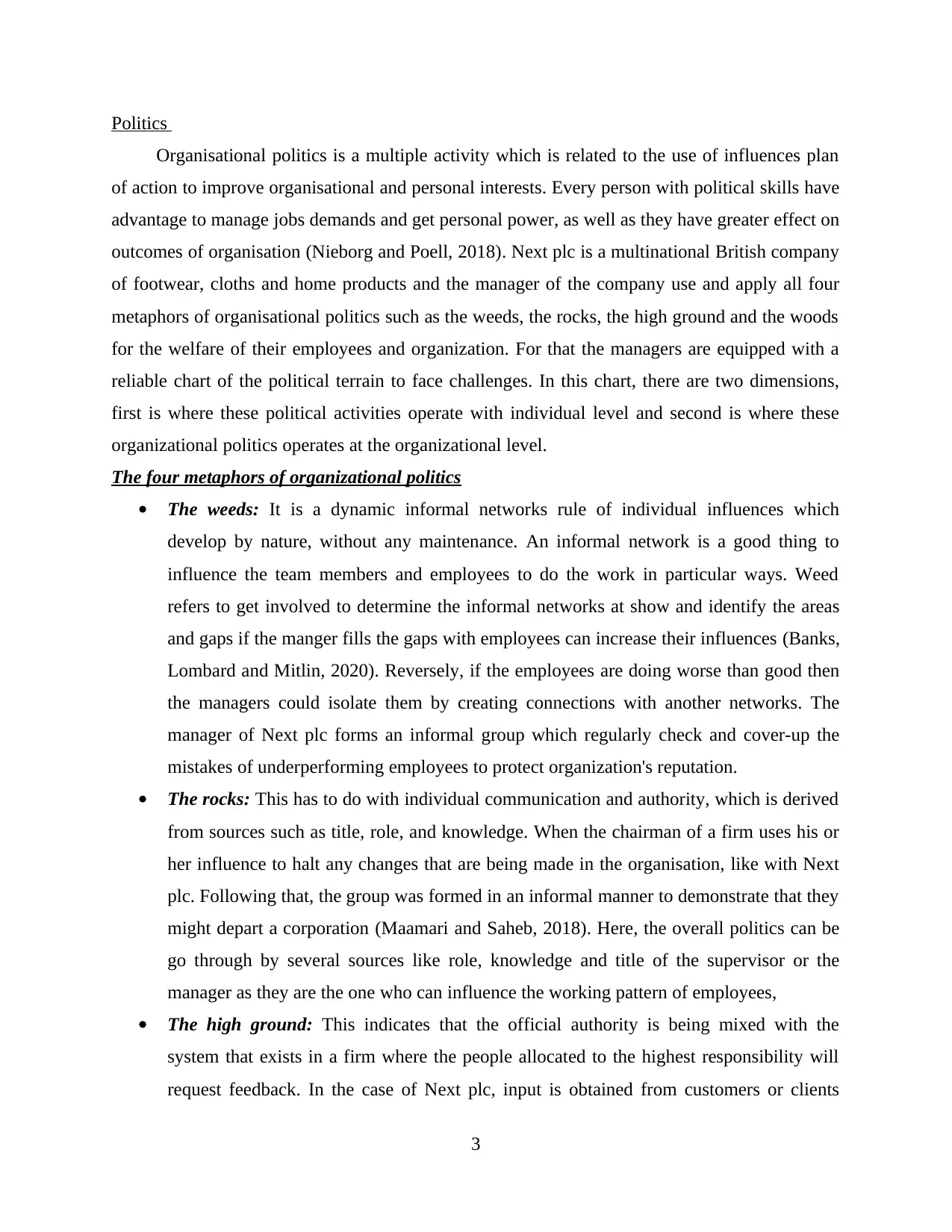
Politics
Organisational politics is a multiple activity which is related to the use of influences plan
of action to improve organisational and personal interests. Every person with political skills have
advantage to manage jobs demands and get personal power, as well as they have greater effect on
outcomes of organisation (Nieborg and Poell, 2018). Next plc is a multinational British company
of footwear, cloths and home products and the manager of the company use and apply all four
metaphors of organisational politics such as the weeds, the rocks, the high ground and the woods
for the welfare of their employees and organization. For that the managers are equipped with a
reliable chart of the political terrain to face challenges. In this chart, there are two dimensions,
first is where these political activities operate with individual level and second is where these
organizational politics operates at the organizational level.
The four metaphors of organizational politics
The weeds: It is a dynamic informal networks rule of individual influences which
develop by nature, without any maintenance. An informal network is a good thing to
influence the team members and employees to do the work in particular ways. Weed
refers to get involved to determine the informal networks at show and identify the areas
and gaps if the manger fills the gaps with employees can increase their influences (Banks,
Lombard and Mitlin, 2020). Reversely, if the employees are doing worse than good then
the managers could isolate them by creating connections with another networks. The
manager of Next plc forms an informal group which regularly check and cover-up the
mistakes of underperforming employees to protect organization's reputation.
The rocks: This has to do with individual communication and authority, which is derived
from sources such as title, role, and knowledge. When the chairman of a firm uses his or
her influence to halt any changes that are being made in the organisation, like with Next
plc. Following that, the group was formed in an informal manner to demonstrate that they
might depart a corporation (Maamari and Saheb, 2018). Here, the overall politics can be
go through by several sources like role, knowledge and title of the supervisor or the
manager as they are the one who can influence the working pattern of employees,
The high ground: This indicates that the official authority is being mixed with the
system that exists in a firm where the people allocated to the highest responsibility will
request feedback. In the case of Next plc, input is obtained from customers or clients
3
Organisational politics is a multiple activity which is related to the use of influences plan
of action to improve organisational and personal interests. Every person with political skills have
advantage to manage jobs demands and get personal power, as well as they have greater effect on
outcomes of organisation (Nieborg and Poell, 2018). Next plc is a multinational British company
of footwear, cloths and home products and the manager of the company use and apply all four
metaphors of organisational politics such as the weeds, the rocks, the high ground and the woods
for the welfare of their employees and organization. For that the managers are equipped with a
reliable chart of the political terrain to face challenges. In this chart, there are two dimensions,
first is where these political activities operate with individual level and second is where these
organizational politics operates at the organizational level.
The four metaphors of organizational politics
The weeds: It is a dynamic informal networks rule of individual influences which
develop by nature, without any maintenance. An informal network is a good thing to
influence the team members and employees to do the work in particular ways. Weed
refers to get involved to determine the informal networks at show and identify the areas
and gaps if the manger fills the gaps with employees can increase their influences (Banks,
Lombard and Mitlin, 2020). Reversely, if the employees are doing worse than good then
the managers could isolate them by creating connections with another networks. The
manager of Next plc forms an informal group which regularly check and cover-up the
mistakes of underperforming employees to protect organization's reputation.
The rocks: This has to do with individual communication and authority, which is derived
from sources such as title, role, and knowledge. When the chairman of a firm uses his or
her influence to halt any changes that are being made in the organisation, like with Next
plc. Following that, the group was formed in an informal manner to demonstrate that they
might depart a corporation (Maamari and Saheb, 2018). Here, the overall politics can be
go through by several sources like role, knowledge and title of the supervisor or the
manager as they are the one who can influence the working pattern of employees,
The high ground: This indicates that the official authority is being mixed with the
system that exists in a firm where the people allocated to the highest responsibility will
request feedback. In the case of Next plc, input is obtained from customers or clients
3
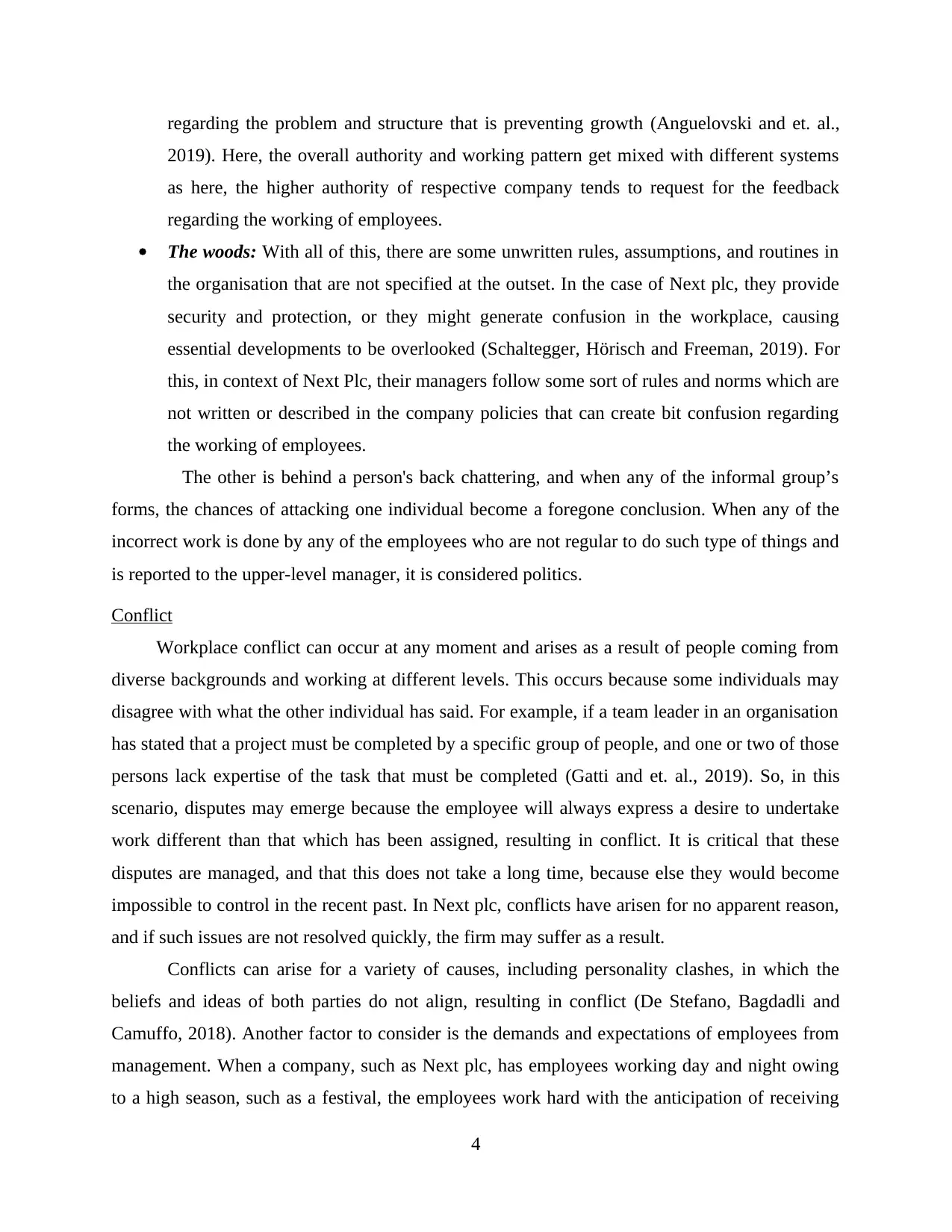
regarding the problem and structure that is preventing growth (Anguelovski and et. al.,
2019). Here, the overall authority and working pattern get mixed with different systems
as here, the higher authority of respective company tends to request for the feedback
regarding the working of employees.
The woods: With all of this, there are some unwritten rules, assumptions, and routines in
the organisation that are not specified at the outset. In the case of Next plc, they provide
security and protection, or they might generate confusion in the workplace, causing
essential developments to be overlooked (Schaltegger, Hörisch and Freeman, 2019). For
this, in context of Next Plc, their managers follow some sort of rules and norms which are
not written or described in the company policies that can create bit confusion regarding
the working of employees.
The other is behind a person's back chattering, and when any of the informal group’s
forms, the chances of attacking one individual become a foregone conclusion. When any of the
incorrect work is done by any of the employees who are not regular to do such type of things and
is reported to the upper-level manager, it is considered politics.
Conflict
Workplace conflict can occur at any moment and arises as a result of people coming from
diverse backgrounds and working at different levels. This occurs because some individuals may
disagree with what the other individual has said. For example, if a team leader in an organisation
has stated that a project must be completed by a specific group of people, and one or two of those
persons lack expertise of the task that must be completed (Gatti and et. al., 2019). So, in this
scenario, disputes may emerge because the employee will always express a desire to undertake
work different than that which has been assigned, resulting in conflict. It is critical that these
disputes are managed, and that this does not take a long time, because else they would become
impossible to control in the recent past. In Next plc, conflicts have arisen for no apparent reason,
and if such issues are not resolved quickly, the firm may suffer as a result.
Conflicts can arise for a variety of causes, including personality clashes, in which the
beliefs and ideas of both parties do not align, resulting in conflict (De Stefano, Bagdadli and
Camuffo, 2018). Another factor to consider is the demands and expectations of employees from
management. When a company, such as Next plc, has employees working day and night owing
to a high season, such as a festival, the employees work hard with the anticipation of receiving
4
2019). Here, the overall authority and working pattern get mixed with different systems
as here, the higher authority of respective company tends to request for the feedback
regarding the working of employees.
The woods: With all of this, there are some unwritten rules, assumptions, and routines in
the organisation that are not specified at the outset. In the case of Next plc, they provide
security and protection, or they might generate confusion in the workplace, causing
essential developments to be overlooked (Schaltegger, Hörisch and Freeman, 2019). For
this, in context of Next Plc, their managers follow some sort of rules and norms which are
not written or described in the company policies that can create bit confusion regarding
the working of employees.
The other is behind a person's back chattering, and when any of the informal group’s
forms, the chances of attacking one individual become a foregone conclusion. When any of the
incorrect work is done by any of the employees who are not regular to do such type of things and
is reported to the upper-level manager, it is considered politics.
Conflict
Workplace conflict can occur at any moment and arises as a result of people coming from
diverse backgrounds and working at different levels. This occurs because some individuals may
disagree with what the other individual has said. For example, if a team leader in an organisation
has stated that a project must be completed by a specific group of people, and one or two of those
persons lack expertise of the task that must be completed (Gatti and et. al., 2019). So, in this
scenario, disputes may emerge because the employee will always express a desire to undertake
work different than that which has been assigned, resulting in conflict. It is critical that these
disputes are managed, and that this does not take a long time, because else they would become
impossible to control in the recent past. In Next plc, conflicts have arisen for no apparent reason,
and if such issues are not resolved quickly, the firm may suffer as a result.
Conflicts can arise for a variety of causes, including personality clashes, in which the
beliefs and ideas of both parties do not align, resulting in conflict (De Stefano, Bagdadli and
Camuffo, 2018). Another factor to consider is the demands and expectations of employees from
management. When a company, such as Next plc, has employees working day and night owing
to a high season, such as a festival, the employees work hard with the anticipation of receiving
4
⊘ This is a preview!⊘
Do you want full access?
Subscribe today to unlock all pages.

Trusted by 1+ million students worldwide
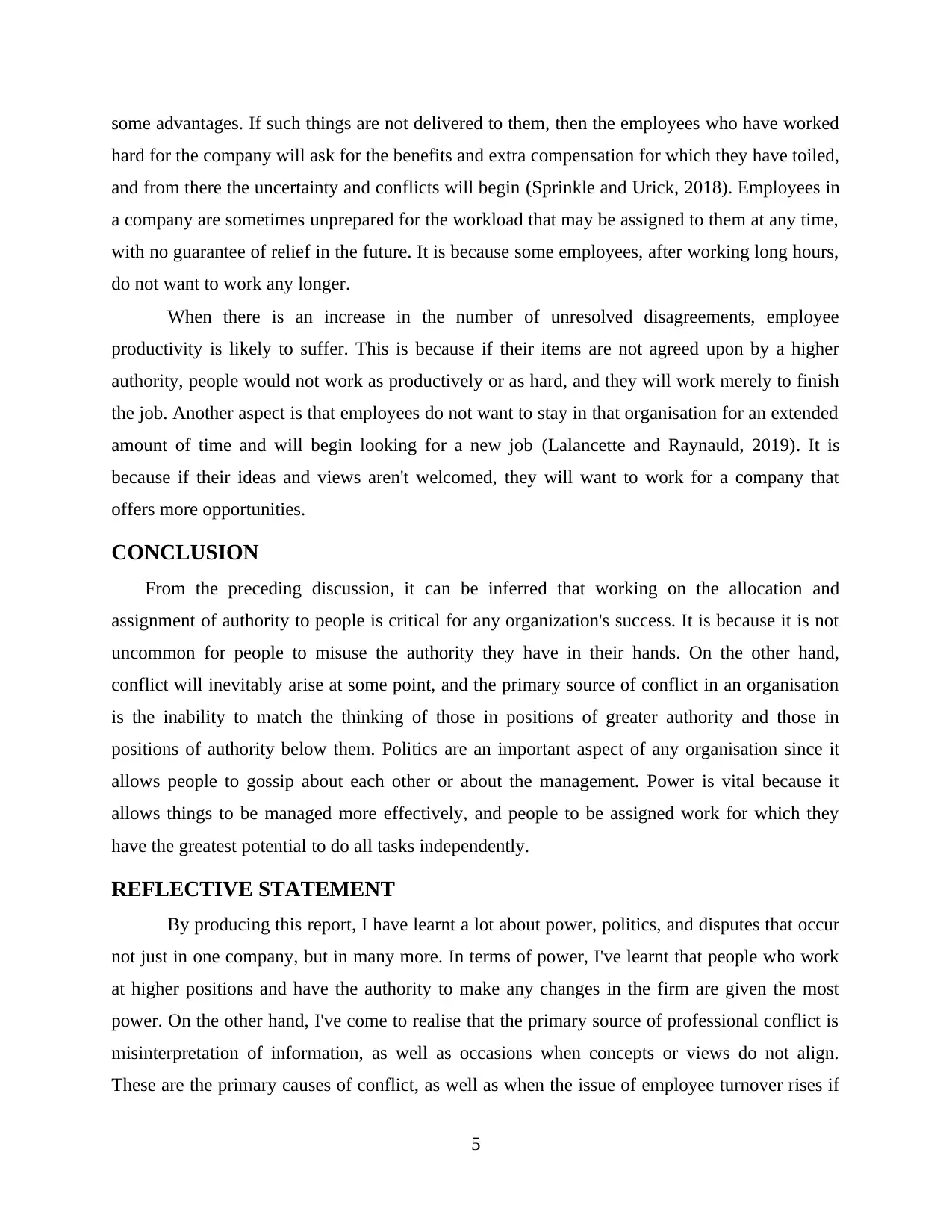
some advantages. If such things are not delivered to them, then the employees who have worked
hard for the company will ask for the benefits and extra compensation for which they have toiled,
and from there the uncertainty and conflicts will begin (Sprinkle and Urick, 2018). Employees in
a company are sometimes unprepared for the workload that may be assigned to them at any time,
with no guarantee of relief in the future. It is because some employees, after working long hours,
do not want to work any longer.
When there is an increase in the number of unresolved disagreements, employee
productivity is likely to suffer. This is because if their items are not agreed upon by a higher
authority, people would not work as productively or as hard, and they will work merely to finish
the job. Another aspect is that employees do not want to stay in that organisation for an extended
amount of time and will begin looking for a new job (Lalancette and Raynauld, 2019). It is
because if their ideas and views aren't welcomed, they will want to work for a company that
offers more opportunities.
CONCLUSION
From the preceding discussion, it can be inferred that working on the allocation and
assignment of authority to people is critical for any organization's success. It is because it is not
uncommon for people to misuse the authority they have in their hands. On the other hand,
conflict will inevitably arise at some point, and the primary source of conflict in an organisation
is the inability to match the thinking of those in positions of greater authority and those in
positions of authority below them. Politics are an important aspect of any organisation since it
allows people to gossip about each other or about the management. Power is vital because it
allows things to be managed more effectively, and people to be assigned work for which they
have the greatest potential to do all tasks independently.
REFLECTIVE STATEMENT
By producing this report, I have learnt a lot about power, politics, and disputes that occur
not just in one company, but in many more. In terms of power, I've learnt that people who work
at higher positions and have the authority to make any changes in the firm are given the most
power. On the other hand, I've come to realise that the primary source of professional conflict is
misinterpretation of information, as well as occasions when concepts or views do not align.
These are the primary causes of conflict, as well as when the issue of employee turnover rises if
5
hard for the company will ask for the benefits and extra compensation for which they have toiled,
and from there the uncertainty and conflicts will begin (Sprinkle and Urick, 2018). Employees in
a company are sometimes unprepared for the workload that may be assigned to them at any time,
with no guarantee of relief in the future. It is because some employees, after working long hours,
do not want to work any longer.
When there is an increase in the number of unresolved disagreements, employee
productivity is likely to suffer. This is because if their items are not agreed upon by a higher
authority, people would not work as productively or as hard, and they will work merely to finish
the job. Another aspect is that employees do not want to stay in that organisation for an extended
amount of time and will begin looking for a new job (Lalancette and Raynauld, 2019). It is
because if their ideas and views aren't welcomed, they will want to work for a company that
offers more opportunities.
CONCLUSION
From the preceding discussion, it can be inferred that working on the allocation and
assignment of authority to people is critical for any organization's success. It is because it is not
uncommon for people to misuse the authority they have in their hands. On the other hand,
conflict will inevitably arise at some point, and the primary source of conflict in an organisation
is the inability to match the thinking of those in positions of greater authority and those in
positions of authority below them. Politics are an important aspect of any organisation since it
allows people to gossip about each other or about the management. Power is vital because it
allows things to be managed more effectively, and people to be assigned work for which they
have the greatest potential to do all tasks independently.
REFLECTIVE STATEMENT
By producing this report, I have learnt a lot about power, politics, and disputes that occur
not just in one company, but in many more. In terms of power, I've learnt that people who work
at higher positions and have the authority to make any changes in the firm are given the most
power. On the other hand, I've come to realise that the primary source of professional conflict is
misinterpretation of information, as well as occasions when concepts or views do not align.
These are the primary causes of conflict, as well as when the issue of employee turnover rises if
5
Paraphrase This Document
Need a fresh take? Get an instant paraphrase of this document with our AI Paraphraser
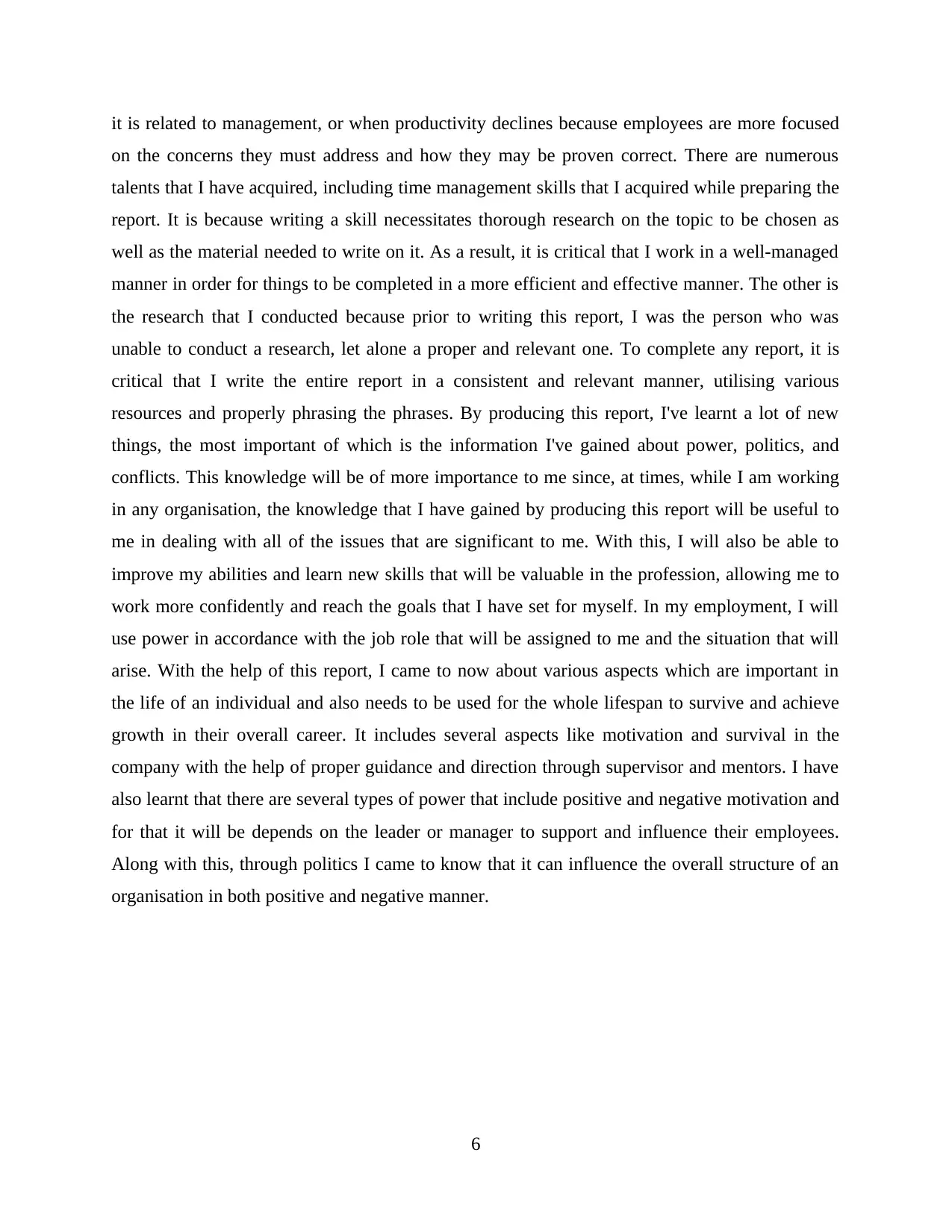
it is related to management, or when productivity declines because employees are more focused
on the concerns they must address and how they may be proven correct. There are numerous
talents that I have acquired, including time management skills that I acquired while preparing the
report. It is because writing a skill necessitates thorough research on the topic to be chosen as
well as the material needed to write on it. As a result, it is critical that I work in a well-managed
manner in order for things to be completed in a more efficient and effective manner. The other is
the research that I conducted because prior to writing this report, I was the person who was
unable to conduct a research, let alone a proper and relevant one. To complete any report, it is
critical that I write the entire report in a consistent and relevant manner, utilising various
resources and properly phrasing the phrases. By producing this report, I've learnt a lot of new
things, the most important of which is the information I've gained about power, politics, and
conflicts. This knowledge will be of more importance to me since, at times, while I am working
in any organisation, the knowledge that I have gained by producing this report will be useful to
me in dealing with all of the issues that are significant to me. With this, I will also be able to
improve my abilities and learn new skills that will be valuable in the profession, allowing me to
work more confidently and reach the goals that I have set for myself. In my employment, I will
use power in accordance with the job role that will be assigned to me and the situation that will
arise. With the help of this report, I came to now about various aspects which are important in
the life of an individual and also needs to be used for the whole lifespan to survive and achieve
growth in their overall career. It includes several aspects like motivation and survival in the
company with the help of proper guidance and direction through supervisor and mentors. I have
also learnt that there are several types of power that include positive and negative motivation and
for that it will be depends on the leader or manager to support and influence their employees.
Along with this, through politics I came to know that it can influence the overall structure of an
organisation in both positive and negative manner.
6
on the concerns they must address and how they may be proven correct. There are numerous
talents that I have acquired, including time management skills that I acquired while preparing the
report. It is because writing a skill necessitates thorough research on the topic to be chosen as
well as the material needed to write on it. As a result, it is critical that I work in a well-managed
manner in order for things to be completed in a more efficient and effective manner. The other is
the research that I conducted because prior to writing this report, I was the person who was
unable to conduct a research, let alone a proper and relevant one. To complete any report, it is
critical that I write the entire report in a consistent and relevant manner, utilising various
resources and properly phrasing the phrases. By producing this report, I've learnt a lot of new
things, the most important of which is the information I've gained about power, politics, and
conflicts. This knowledge will be of more importance to me since, at times, while I am working
in any organisation, the knowledge that I have gained by producing this report will be useful to
me in dealing with all of the issues that are significant to me. With this, I will also be able to
improve my abilities and learn new skills that will be valuable in the profession, allowing me to
work more confidently and reach the goals that I have set for myself. In my employment, I will
use power in accordance with the job role that will be assigned to me and the situation that will
arise. With the help of this report, I came to now about various aspects which are important in
the life of an individual and also needs to be used for the whole lifespan to survive and achieve
growth in their overall career. It includes several aspects like motivation and survival in the
company with the help of proper guidance and direction through supervisor and mentors. I have
also learnt that there are several types of power that include positive and negative motivation and
for that it will be depends on the leader or manager to support and influence their employees.
Along with this, through politics I came to know that it can influence the overall structure of an
organisation in both positive and negative manner.
6
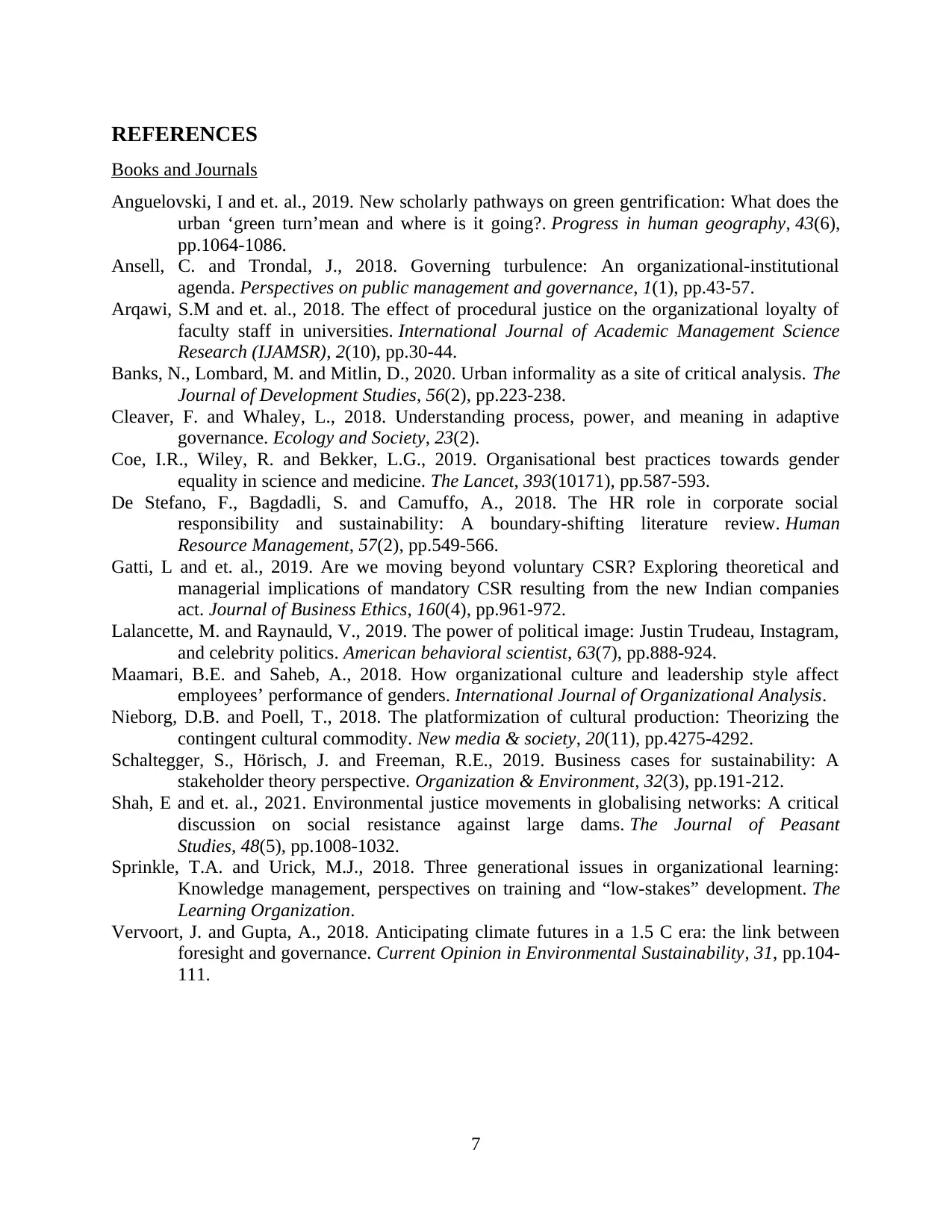
REFERENCES
Books and Journals
Anguelovski, I and et. al., 2019. New scholarly pathways on green gentrification: What does the
urban ‘green turn’mean and where is it going?. Progress in human geography, 43(6),
pp.1064-1086.
Ansell, C. and Trondal, J., 2018. Governing turbulence: An organizational-institutional
agenda. Perspectives on public management and governance, 1(1), pp.43-57.
Arqawi, S.M and et. al., 2018. The effect of procedural justice on the organizational loyalty of
faculty staff in universities. International Journal of Academic Management Science
Research (IJAMSR), 2(10), pp.30-44.
Banks, N., Lombard, M. and Mitlin, D., 2020. Urban informality as a site of critical analysis. The
Journal of Development Studies, 56(2), pp.223-238.
Cleaver, F. and Whaley, L., 2018. Understanding process, power, and meaning in adaptive
governance. Ecology and Society, 23(2).
Coe, I.R., Wiley, R. and Bekker, L.G., 2019. Organisational best practices towards gender
equality in science and medicine. The Lancet, 393(10171), pp.587-593.
De Stefano, F., Bagdadli, S. and Camuffo, A., 2018. The HR role in corporate social
responsibility and sustainability: A boundary‐shifting literature review. Human
Resource Management, 57(2), pp.549-566.
Gatti, L and et. al., 2019. Are we moving beyond voluntary CSR? Exploring theoretical and
managerial implications of mandatory CSR resulting from the new Indian companies
act. Journal of Business Ethics, 160(4), pp.961-972.
Lalancette, M. and Raynauld, V., 2019. The power of political image: Justin Trudeau, Instagram,
and celebrity politics. American behavioral scientist, 63(7), pp.888-924.
Maamari, B.E. and Saheb, A., 2018. How organizational culture and leadership style affect
employees’ performance of genders. International Journal of Organizational Analysis.
Nieborg, D.B. and Poell, T., 2018. The platformization of cultural production: Theorizing the
contingent cultural commodity. New media & society, 20(11), pp.4275-4292.
Schaltegger, S., Hörisch, J. and Freeman, R.E., 2019. Business cases for sustainability: A
stakeholder theory perspective. Organization & Environment, 32(3), pp.191-212.
Shah, E and et. al., 2021. Environmental justice movements in globalising networks: A critical
discussion on social resistance against large dams. The Journal of Peasant
Studies, 48(5), pp.1008-1032.
Sprinkle, T.A. and Urick, M.J., 2018. Three generational issues in organizational learning:
Knowledge management, perspectives on training and “low-stakes” development. The
Learning Organization.
Vervoort, J. and Gupta, A., 2018. Anticipating climate futures in a 1.5 C era: the link between
foresight and governance. Current Opinion in Environmental Sustainability, 31, pp.104-
111.
7
Books and Journals
Anguelovski, I and et. al., 2019. New scholarly pathways on green gentrification: What does the
urban ‘green turn’mean and where is it going?. Progress in human geography, 43(6),
pp.1064-1086.
Ansell, C. and Trondal, J., 2018. Governing turbulence: An organizational-institutional
agenda. Perspectives on public management and governance, 1(1), pp.43-57.
Arqawi, S.M and et. al., 2018. The effect of procedural justice on the organizational loyalty of
faculty staff in universities. International Journal of Academic Management Science
Research (IJAMSR), 2(10), pp.30-44.
Banks, N., Lombard, M. and Mitlin, D., 2020. Urban informality as a site of critical analysis. The
Journal of Development Studies, 56(2), pp.223-238.
Cleaver, F. and Whaley, L., 2018. Understanding process, power, and meaning in adaptive
governance. Ecology and Society, 23(2).
Coe, I.R., Wiley, R. and Bekker, L.G., 2019. Organisational best practices towards gender
equality in science and medicine. The Lancet, 393(10171), pp.587-593.
De Stefano, F., Bagdadli, S. and Camuffo, A., 2018. The HR role in corporate social
responsibility and sustainability: A boundary‐shifting literature review. Human
Resource Management, 57(2), pp.549-566.
Gatti, L and et. al., 2019. Are we moving beyond voluntary CSR? Exploring theoretical and
managerial implications of mandatory CSR resulting from the new Indian companies
act. Journal of Business Ethics, 160(4), pp.961-972.
Lalancette, M. and Raynauld, V., 2019. The power of political image: Justin Trudeau, Instagram,
and celebrity politics. American behavioral scientist, 63(7), pp.888-924.
Maamari, B.E. and Saheb, A., 2018. How organizational culture and leadership style affect
employees’ performance of genders. International Journal of Organizational Analysis.
Nieborg, D.B. and Poell, T., 2018. The platformization of cultural production: Theorizing the
contingent cultural commodity. New media & society, 20(11), pp.4275-4292.
Schaltegger, S., Hörisch, J. and Freeman, R.E., 2019. Business cases for sustainability: A
stakeholder theory perspective. Organization & Environment, 32(3), pp.191-212.
Shah, E and et. al., 2021. Environmental justice movements in globalising networks: A critical
discussion on social resistance against large dams. The Journal of Peasant
Studies, 48(5), pp.1008-1032.
Sprinkle, T.A. and Urick, M.J., 2018. Three generational issues in organizational learning:
Knowledge management, perspectives on training and “low-stakes” development. The
Learning Organization.
Vervoort, J. and Gupta, A., 2018. Anticipating climate futures in a 1.5 C era: the link between
foresight and governance. Current Opinion in Environmental Sustainability, 31, pp.104-
111.
7
⊘ This is a preview!⊘
Do you want full access?
Subscribe today to unlock all pages.

Trusted by 1+ million students worldwide

8
1 out of 10
Related Documents
Your All-in-One AI-Powered Toolkit for Academic Success.
+13062052269
info@desklib.com
Available 24*7 on WhatsApp / Email
![[object Object]](/_next/static/media/star-bottom.7253800d.svg)
Unlock your academic potential
Copyright © 2020–2025 A2Z Services. All Rights Reserved. Developed and managed by ZUCOL.




